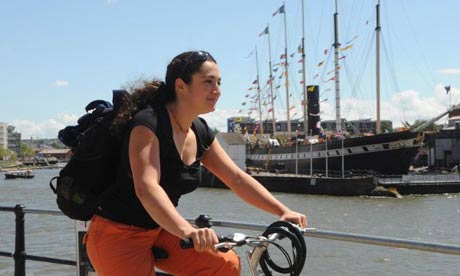
Move over Amsterdam and Paris; on your bike Copenhagen. Britain will soon boast cities with the facilities to rival Europe's most cycle-friendly capitals.
That, at least, is the vision of the Department for Transport, which yesterday announced a £100m investment to turn one city and 11 towns into centres of urban cycling, in an effort to encourage 2.5 million Britons to get pedalling.
Chief among the recipients is Bristol, which saw off competition from Manchester and Leicester to be named the country's first "cycling city". The city council, in partnership with neighbouring South Gloucestershire council, won the bid promising Britain's first Paris-style on-street bike rental network, the offer of free bikes to people in deprived communities, state-of-the-art shower and locker facilities in the city centre, dedicated commuter "cycle ways" linking the suburbs and the centre, and an ambitious expansion in training for schoolchildren. It will match its £11.4m grant with the same amount from the two councils and their partners over the next 30 months.
A further 11 towns will receive awards ranging from £600,000 to £4.8m to become "cycling demonstration" centres, again matched by equivalent funds from local authorities. They are Blackpool, Cambridge, Chester, Colchester, Leighton-Linslade, Shrewsbury, Southend-on-Sea, Southport with Ainsdale, Stoke, Woking and York.
Helen Holland, leader of Bristol city council, described the award as "absolutely fantastic", outlining plans to develop Bristol's waterfront cycle route and to improve access and lighting to the extremely popular Bristol to Bath cycle path. Between 3% and 4% of trips in the city are already made by bike, or approximately 12,000 journeys a day, a figure that has increased by 12% in the past year. The city's target is to increase cycling by 30% by 2011.
Ruth Kelly, the transport minister, said high fuel prices were boosting cycling's popularity compared with driving. She said she expected Bristol and the other cycling towns to generate the kind of enthusiasm seen in cities like Amsterdam - the UK currently ranks 12th out of 15 European nations in terms of average distance cycled each year. "In these towns and cities we expect to reach 20% of journeys by bikes, which is the level of some European cities," she said.
"I know people are concerned about safety but it's a misperception that cycling is more dangerous. The number of cyclists getting killed or seriously injured has fallen by a third since the 1990s. We are also investing in infrastructure to make cycling safer, as well as high-quality cycle training for children." The government has already announced plans to extend its Bikeability cycle proficiency training to half a million children by 2012 and build 250 new Safe Links to School.
At the Cycle Life shop in central Bristol yesterday, business was brisk on "urban" bikes, a hybrid of fat-tyred mountain bicycles and more town-friendly road bikes, while Simon Frost, a mechanic, said the shop had been buzzing with talk of the investment.
"The traffic here is worse than London. The roads were made for horses and carts, not for cars, and the bus service is absolutely lousy. We are a small city here and so most things are reasonably cycle-able. So this sort of thing is exactly what we need."
Louise Neale, transport policy officer for Darlington, one of six towns named cycling demonstration centres in 2005, said Bristol and the other towns could expect to see significant increases in bike usage, comparable to Darlington's 20% increase in the year to May 2007. Cycling to school in the town, too, has increased from 0.9% in 2005 to 4.4% at the start of this school year. "The funding means that people can provide the information and the infrastructure to make a change. I would say that most towns should be able to see an increase in their cycling levels."

